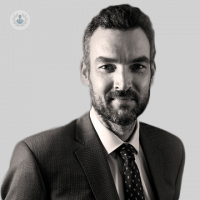Brachialgia how treat pinched nerve neck
Escrito por:Brachialgia is the medical term for a pinched nerve in the neck which causes sudden and prolonged pain in the arm or shoulder blade. It occurs mostly in people aged 50 to 54 years old, but more commonly in men.
Mr David Bell, a London-based neurosurgeon who specialises in complex spinal surgery, explains what this condition is and what kind of treatment is available.

What is brachialgia?
Brachialgia, also known as cervical radiculopathy, is pain in the arms caused by a compressed or pinched nerve in the neck. It is described as the upper body equivalent of sciatica, and much like sciatica, the onset can be sudden and unexpected.
Why does brachialgia occur?
The spinal cord and spinal nerves run inside the spinal canal and intervertebral foramen. These passageways protect and prevent any damage to the spinal cord and spinal nerves. However, the size of these passageways can reduce and compression can occur.
There are various conditions that can cause this such as, intervertebral disc herniation, degenerative disc disease, osteophyte formation (bony lump) and spinal stenosis (narrowing). The consequence of these conditions may involve increased pressure on the cervical nerve roots leaving you with pain in your neck, shoulders and arms.
Symptoms of brachialgia
According to national statistics, around 107 men out of 100,000 will be diagnosed with brachialgia every year, however just 64 out of 100,000 women will be diagnosed. Symptoms are likely to include one or more of the following:
- Pain in your neck, arm or shoulder blade
- Paraesthesia (pins and needles) in your arms, which may feel more uncomfortable when you stretch your neck or turn your head
- Tingling sensations
- Numbness in your arm
- Sensation of weakness in your arm
Diagnosis of brachialgia
Usually, to diagnose brachialgia, you will need to undergo some or all of the following tests:
A doctor will first need to understand your symptoms, when they developed and how long you’ve had them. It’s likely they’ll also look into your medical history and do a physical examination of your neck to better understand what is causing the symptoms.
Potential treatment options
There are many cases of brachialgia resolve spontaneously and can initially be treated conservatively to avoid any unnecessary risks.
Physiotherapy is normally the non-surgical treatment of choice, which includes specialised exercises to strengthen the muscles. Other forms of therapy include osteopathy and hydrotherapy.
If symptoms don’t ease from these therapies, then medication and/or steroid injections can be considered to reduce any swelling and lessen the pain.
Sometimes, simple modifications in the workplace or at home can improve symptoms, such as avoiding heavy lifting or repetitive neck or arm movements.
Alternatively, surgery may be a treatment option if the non-surgical options fail to help. The procedures that are offered include anterior cervical discectomy, cervical decompression, spinal fusion or disc replacement.
Your doctor will discuss the most suitable treatment with you, as it always depends on the nature and location of the pinched nerve.
If you believe you are suffering from brachialgia and would like to be seen by a specialist, visit Mr David Bell’s profile and book an appointment with him online.


